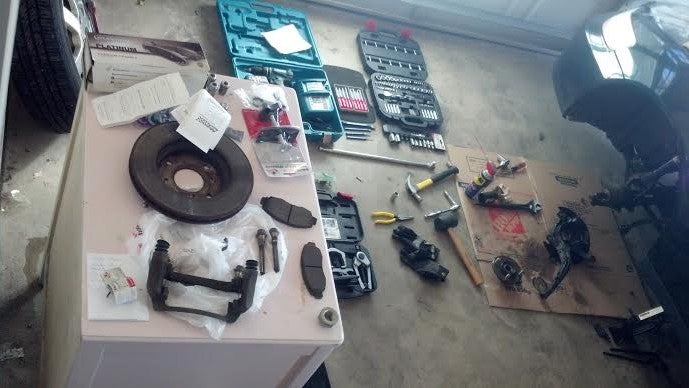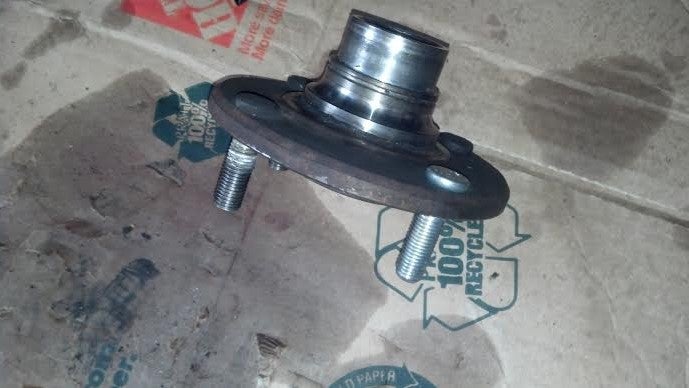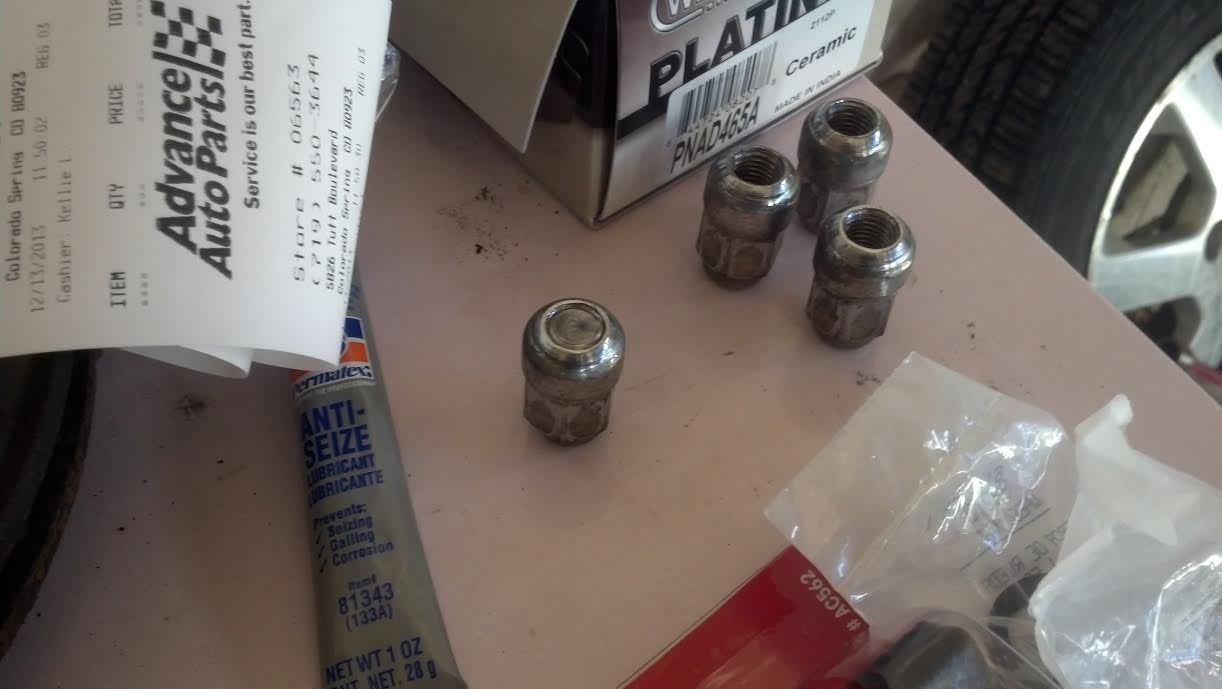 "Enginerrrrrrrrr" (Enginerrrrrrrrr)
"Enginerrrrrrrrr" (Enginerrrrrrrrr)
12/14/2013 at 17:34 • Filed to: None
 0
0
 14
14
 "Enginerrrrrrrrr" (Enginerrrrrrrrr)
"Enginerrrrrrrrr" (Enginerrrrrrrrr)
12/14/2013 at 17:34 • Filed to: None |  0 0
|  14 14 |
So I have never changed my brake pads myself so I figured I would give it a try.
As I take the first wheel off, one of the lug nuts comes off with the stud sheared off inside.
Shit.
Lookin up how to replace the lug studs, it looked like a pretty easy fix.
Turns out on a 2000 Honda Accord, it is not. By the time I was able to get the new stud in, this is what my garage looked like:

New Stud:

Was almost able to do everything myself until I found out I had to press out the hub from the wheel bearing.
Let's just say I learned a lot the last two days.
All because of this little shit.

And guess what? The brake pads were fine, awesome.
Got to change a friend's brake pads today and it went incredibly quicker. Just a couple hours (because of one shitty caliper piston) instead of two days of trying to figure out what to do.
Anywho, that was my last few days.
 Mathias Rios
> Enginerrrrrrrrr
Mathias Rios
> Enginerrrrrrrrr
12/14/2013 at 17:36 |
|
These kind of nightmares happen sometimes in automotive repair. They make everything very bad but then you realize your learned a lot, and the next time you're probably more experienced.
 Zipppy, Mazdurp builder, Probeski owner and former ricerboy
> Enginerrrrrrrrr
Zipppy, Mazdurp builder, Probeski owner and former ricerboy
> Enginerrrrrrrrr
12/14/2013 at 17:37 |
|
I feel ya. It seems like that stud was over-torqued.
 Enginerrrrrrrrr
> Mathias Rios
Enginerrrrrrrrr
> Mathias Rios
12/14/2013 at 17:38 |
|
Exactly. Luckily I love this crap. Even with all the hell I went through I didn't mind helping out the friend. Her brake pads were absolutely gone and luckily I had some experience from this haha.
 Enginerrrrrrrrr
> Zipppy, Mazdurp builder, Probeski owner and former ricerboy
Enginerrrrrrrrr
> Zipppy, Mazdurp builder, Probeski owner and former ricerboy
12/14/2013 at 17:42 |
|
That's what I was thinking. It was taken in some time when I wasn't home to have the tires rotated and I think that is when it happened.
I put some anti-seize on to prevent that from happening again...
 FJ80WaitinForaLSV8
> Enginerrrrrrrrr
FJ80WaitinForaLSV8
> Enginerrrrrrrrr
12/14/2013 at 17:46 |
|
this is one of the reason why I hate shops tightening my lug nuts. The other reason is when you get a flat they are usually incredibly hard to get undone without a huge breaker bar.
 desertdog5051
> Enginerrrrrrrrr
desertdog5051
> Enginerrrrrrrrr
12/14/2013 at 17:58 |
|
Glad you got the Anti-Seize. I have used that for a long time. Works. Especially in salt areas. When I take my truck or car in to have the tires rotated, I always check the torque they applied. Ya never know.
 Aaron James
> Enginerrrrrrrrr
Aaron James
> Enginerrrrrrrrr
12/14/2013 at 18:09 |
|
Same thing happened to me the first time I did my 99 Accord. I didn't take the hub off though, I just bent the backing plate a little and pounded them out. I found one are where there was just enough room. Of course it chewed up the backing plate but i was in a hurry. 3 snapped of mine though.
 tromoly
> FJ80WaitinForaLSV8
tromoly
> FJ80WaitinForaLSV8
12/14/2013 at 21:03 |
|
Exactly. At work if we pull a wheel off a vehicle we use the impact to remove the lugnut, but to tighten back on we finger tighten before using either a torque wrench or a long ratchet. Works great every time.
 orcim
> Enginerrrrrrrrr
orcim
> Enginerrrrrrrrr
12/14/2013 at 22:21 |
|
OT: Doing pads on cars with ABS: make sure to close off the brake line while compressing the caliper pistons for older cars. Clamp the flexible brake line, open the bleed valve, *then* compress the pistons.
It's important. Trust me.
Oh, and anti-seize? Mandatory. For everything. Including marital relations. ;)
 Enginerrrrrrrrr
> orcim
Enginerrrrrrrrr
> orcim
12/16/2013 at 11:17 |
|
Why would it matter if it has ABS? And with everything I read, no one mentions what you said about the brake line. Everything I read/saw mentions that the brake fluid will just go back into the master cylinder when you compress the piston. How old are we talking here?
I agree with the anti seize though haha.
 Enginerrrrrrrrr
> Aaron James
Enginerrrrrrrrr
> Aaron James
12/16/2013 at 11:19 |
|
Damn that sucks.
I had to take the hub off though. The housing for the wheel bearing is shaped in such a way that it is impossible to get them out unless you seriously grind it down, which I didn't want to do, mechanical integrity and such.
 orcim
> Enginerrrrrrrrr
orcim
> Enginerrrrrrrrr
12/16/2013 at 13:59 |
|
Lemme 'asplain. Was working on a car that was 16 years old. Had replaced the pads many times, never closing off the brake line and letting the compressed fluid bleed out. That caliper on the one side closest to the ABS unit (it was mounted right inside the fender on that side) had some corrosion inside it.. still moving fine I thought, though. It wasn't. Squeezed it in, put in the pads, checked the brakes and voila', something was wrong. Did some bleeding and the fluid was dirty on that side. Pulled it off, went all fixy on it and there were little cracks in the piston boot, not moving out right, etc. which meant rebuild or replace. Got that done, and then checked because the ABS was giving some trouble. It was not working right, and the light would come on.
Took it apart (thinking to fix, but of course that didn't happen) and found little bits of matter in the channels inside. When I'd squeezed the pistons, I'd forced that gunky corrsion laden brake fluid back into the system, into the ABS, and toasted it. I had to remove the ABS, and just hardwire it with brake lines and couplers, which worked fine as regular brakes (including unplugging the ABS computer from the system so it wasn't always complaining about it.) Mentioned this on a couple forums with mechanics, and they agreed that I'd been a dummy and they close off the lines and open the bleed valves to compress.
So - if no possibility of corrosion in the caliper? Probably ok. (Had been for years for me, so..) If possible? I'd close the line off. I live in a place where everything rots due to light salt and humidity, too, so there's that helping me to be defensive on this stuff.
 Aaron James
> Enginerrrrrrrrr
Aaron James
> Enginerrrrrrrrr
12/16/2013 at 15:15 |
|
yeah, my way was definitely not the right way, I didn't have the right socket or a bunch of time so I just beat and bent and hammered until they came out.
 Enginerrrrrrrrr
> orcim
Enginerrrrrrrrr
> orcim
12/16/2013 at 21:42 |
|
Wow, never thought of that. Will definitely be doing that next time. The bleed valve isn't hard to remove so will be doing that from now on.
thanks for the story